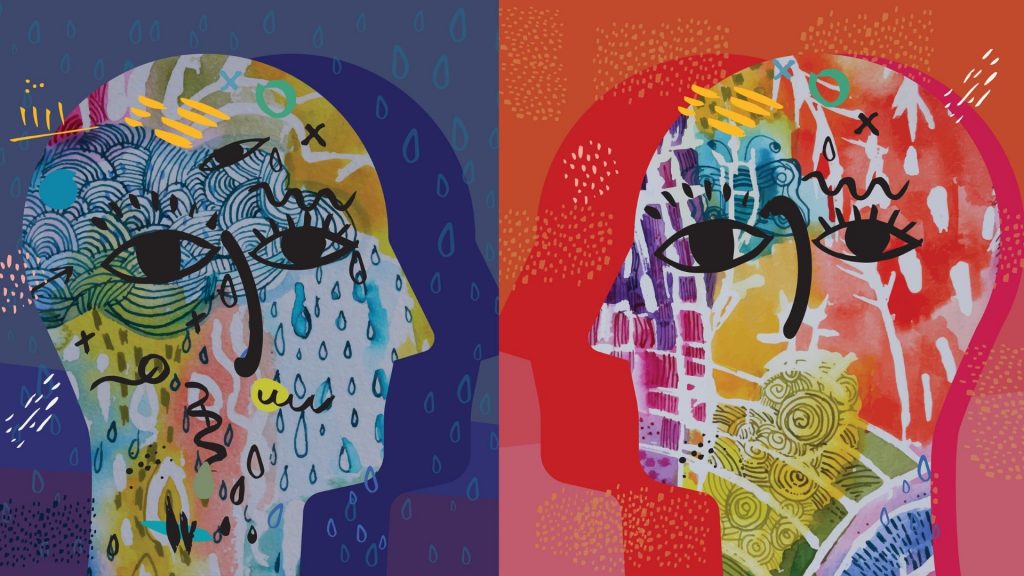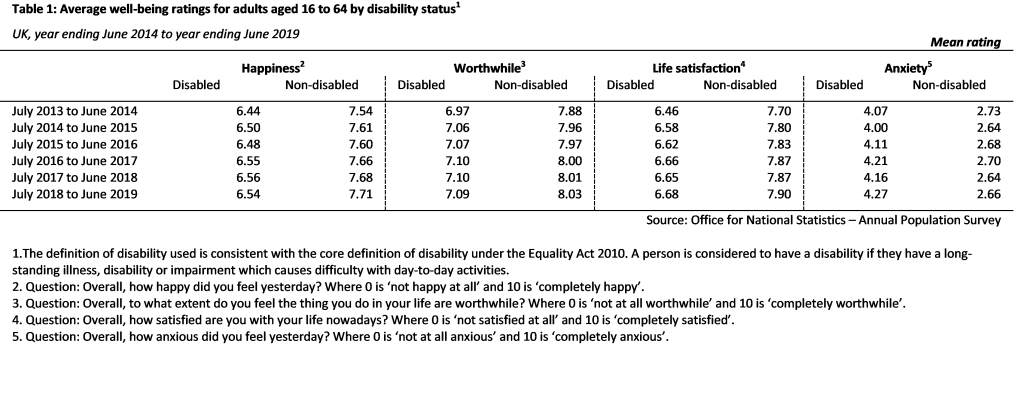Disability onset: what are the effects on individual wellbeing over time?
25 March 2020
In our latest post, John Poole introduces his doctoral research on the impact of disability onset on individual wellbeing in the UK.
How satisfied do you feel with life on a scale of 0-10, all things considered?
According to data released by the Office for National Statistics (ONS) in December 2019, if you thought of a number greater than 7.90, you are happier than the average UK resident. For disabled people, however, the average self-reported level of life satisfaction is only 6.68 out of 10. Moreover, compared to non-disabled people, they are less likely to feel that life is worthwhile and live with higher levels of anxiety.

Wellbeing gaps
Whilst wellbeing overall has grown in the last few years, a concern is that a ‘disability wellbeing gap’ persists. News reports frequently highlight various pay gaps that exist within society but surprisingly little attention is paid to “wellbeing gaps”. Some academics argue that estimating these gaps is just as important as measuring more commonplace variables found in economics literature such as income, consumption, employment or economic growth. A well-known example to support this is the Easterlin Paradox (Easterlin, 1995) – the finding that increases in a country’s national income do not translate into improved wellbeing.
The ONS data perhaps contradicts the “hedonic treadmill” (Brickman & Campbell, 1971), the idea that no matter what positive or negative life events beset us, we are forever destined to return to a set level of overall life satisfaction. This concept has found a lot of support within psychological literature (e.g Frederick & Loewenstein, 1999; Diener et al., 1999).
Conversely, traditional economics used to assume that life events such as disability onset exhibited permanent effects upon happiness by permanently lowering income and consumption opportunities.
The term disability onset refers to working-age people who were not already disabled, i.e. they didn’t have a disability at birth or in earlier life, who have experienced the onset of disability, most likely for the first time, possibly from an accident or from a degenerative disease.
Economics researchers in the last decade or so have taken a growing interest in wellbeing and adaptation (e.g. Clark et al. 2008). Helping to close this gap between the two social sciences is a big motivator of my PhD thesis in Economics.
In collaboration with the Economic and Social Research Council (ESRC) and Disability Rights UK, I intend to apply statistical models to UK household survey data to measure the effects of disability onset upon subjective wellbeing, not only at onset, but over the post-onset period too, observing how much adaptation occurs, if any.
Disability Rights UK promote career opportunities and independent living for disabled people as well as influencing public attitudes and behaviour towards disability. My thesis will provide Disability Rights UK with up-to-date nationally representative evidence on how disability onset among working-aged people affects wellbeing for different groups of people and their families so that they can inform public policy with regards to where to most effectively allocate funding and support services.
Understanding Society
A major strength of this study is access to a rich source of panel data called Understanding Society, which surveyed the same set of individuals annually between 2011 and 2018. It includes data on personal characteristics, family composition, consumption habits, use of leisure time, financial situation, health, and more importantly, on wellbeing and disability status. Due to the longitudinal nature of the data, I can observe the above variables prior to disability onset, at onset and post-onset.
This thesis will allow me to ask various questions: does wellbeing eventually revert to initial levels after disability onset, and if so, by how much? Does the level of adaptation depend on age, race, gender, marital status, education level, income or persistence and severity of the disability? How much of the change in wellbeing is due to the potential consequences of disability onset, such as changes in income, consumption or household composition?
Moreover, I want to ask the question of how onset affects the wellbeing of spouses and children of disabled people. Economic literature has associated disability onset with lower household incomes (e.g. Stephens, 2001; Singleton, 2012) and hence, increased probability of financial difficulties and material deprivation. It has also been linked with strained family relationships which can sometimes lead to separation and divorce (Singleton, 2012).
Furthermore, exploring the effect on a child’s wellbeing when their parent experiences disability will break new ground as this relationship has not been measured before, to my knowledge, within economics literature. Understanding Society includes data concerning the child’s home life and school life, such as their academic progress, whether they are bullied, are disruptive in class, get on with their siblings, partake in hobbies, receive help at home with emotional or school issues and whether they care for a parent. Hence, there are many variables from which to attempt to estimate what makes a child happy and how this is affected by disability onset in a parent. I hope my thesis will shine a light on the experience of family members of the disabled, whose wellbeing may otherwise be overlooked.
I have completed an MSc in Economics at Swansea University, an MRes here at Cardiff, and have just started to undertake the research phase of the PhD, which I aim to complete in March 2022. I look forward to sharing and discussing my findings with Disability Rights UK.
I would invite anyone interested in my research to contact me.
This project is supervised by Professors Melanie Jones, Victoria Wass and Dr Ezgi Kaya. Professor Jones’ work on disability and life satisfaction preceded this project.
John
Poole is a doctoral student at Cardiff Business
School. His PhD is ESRC-funded and in collaboration with Disability Rights UK,
he is exploring the impact of disability onset on individual wellbeing in the
UK.
Sources
- Clark, A., Diener, E., Georgellis, Y. & Lucas, R. (2008). Lags and leads in life satisfaction: a test of the baseline hypothesis. The Economic Journal, 118(2008), pp. F222-F243.
- Diener, E., Suh, E.M., Lucas, R.E. & Smith, H.L. (1999). Subjective Well-Being: Three Decades of Progress. Psychological Bulletin, 125(2), 1999, pp. 276-302.
- Disability Rights UK.
- Economic and Social Research Council.
- Frederick, S. & Loewenstein, G. (1999). Hedonic Adaptation. In Kahneman, D., Diener, E. & Schwartz, N. (Eds.), Well-Being: Foundations of Hedonic Psychology, pp. 302-329.
- Jones, M.K., Mavromaras, K., Sloane, P.J. & Wei, Z. (2018). The dynamic effect of disability on work and subjective well-being. Oxford Economic Papers, 70(3), July 2018, pp. 635-657.
- Office for National Statistics (2019). Disability, well-being and loneliness, UK: 2019. 2 December 2019.
- Singleton, P. (2012). Insult to Injury: Disability, Earnings, and Divorce. Journal of Human Resources, 47(4).
- Stephens, M. (2001). The Long-Run Consumption Effects of Earnings Shocks. The Review of Economics and Statistics, 83(1), February 2001, pp. 28-36.
- Understanding Society.
Comments
- March 2024
- April 2023
- August 2022
- July 2022
- April 2022
- March 2022
- February 2022
- December 2021
- October 2021
- September 2021
- May 2021
- April 2021
- March 2021
- February 2021
- January 2021
- December 2020
- November 2020
- October 2020
- September 2020
- August 2020
- July 2020
- June 2020
- May 2020
- April 2020
- March 2020
- February 2020
- January 2020
- November 2019
- October 2019
- September 2019
- August 2019
- July 2019
- June 2019
- May 2019
- April 2019
- March 2019
- February 2019
- January 2019
- December 2018
- November 2018
- October 2018
- September 2018
1 comment
Comments are closed.